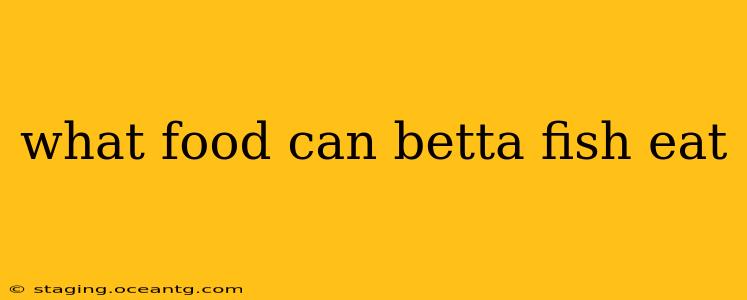Betta fish, with their vibrant colors and flowing fins, are captivating creatures. However, ensuring their health and longevity relies heavily on providing them with a proper diet. Feeding your betta the right food is crucial for maintaining their vibrant colors, boosting their immune system, and preventing common betta health issues. This comprehensive guide will explore what foods betta fish can eat, as well as what to avoid.
What is the Best Food for Betta Fish?
The foundation of a healthy betta diet is high-quality betta fish food. Commercial betta pellets are a convenient and often nutritious option. Look for pellets specifically formulated for bettas, as these are designed to meet their unique nutritional needs. These pellets typically contain a balance of protein, carbohydrates, and essential vitamins and minerals.
Key features to look for in quality betta pellets:
- Sinking pellets: These prevent the food from floating on the surface, encouraging your betta to forage and preventing surface scum.
- Small size: Bettas have relatively small mouths, so ensure the pellets are appropriately sized to avoid choking hazards.
- Nutrient-rich formula: Check the ingredient list for sources of high-quality protein, such as fish meal or krill. Avoid fillers and artificial colors.
What Other Foods Can Betta Fish Eat?
While commercial pellets form the core of a betta's diet, occasional variety can be beneficial and even exciting for your pet. Here are some healthy additions you can offer in moderation:
- Bloodworms: These are a popular treat, rich in protein and highly appealing to bettas. However, they should be given sparingly as they are high in fat. Offer them as an occasional supplement, not a staple.
- Daphnia (water fleas): Another nutritious live food, daphnia offers a good source of protein and fiber. Similar to bloodworms, they should be offered in moderation.
- Brine shrimp: These small crustaceans are a readily available and nutritious live food option. Like bloodworms and daphnia, offer these as an occasional treat.
- Micro-worms: These tiny worms are a great source of protein and are easily consumed by bettas. They can be a useful supplement, but remember moderation is key.
- High-quality flake food: While pellets are preferred, some high-quality flake foods designed for bettas can be offered occasionally as a treat. Make sure to use only small amounts to prevent water pollution.
Can Betta Fish Eat Vegetables?
While bettas are primarily carnivorous, they can tolerate small amounts of certain vegetables. Blanched peas (without the shell) and finely chopped zucchini are sometimes accepted, but it’s essential to monitor your betta’s reaction. If they don't eat it, don't force them. Vegetables should never replace their primary food source.
What Foods Should Betta Fish NOT Eat?
Just as important as knowing what your betta can eat is knowing what foods to avoid. Some foods can be harmful or even fatal:
- Bread: Bread is devoid of nutritional value for bettas and can cause digestive problems.
- Human food: Most human foods are unsuitable for bettas and can be toxic. Avoid giving them anything from your plate.
- Overfeeding: This is a very common problem. It leads to water quality issues, obesity, and a decreased lifespan for your betta. Follow the feeding guidelines on the food packaging and observe your betta's eating habits. If food remains uneaten after a few minutes, remove it.
- Foods high in fat: While small amounts of treats like bloodworms are okay occasionally, regularly feeding your betta high-fat foods can lead to obesity and other health issues.
How Often Should I Feed My Betta Fish?
Generally, adult bettas should be fed a small amount of food once or twice daily. Overfeeding is a common mistake, so it's always better to slightly underfeed than overfeed your betta. Young, growing bettas may need more frequent feeding.
How Much Should I Feed My Betta Fish?
The amount you should feed depends on the size and age of your betta, as well as the type of food. A good rule of thumb is to only feed your betta what they can consume in a few minutes. Remove any uneaten food to prevent water quality issues.
By following these guidelines, you can ensure your betta fish receives the proper nutrition it needs to thrive and enjoy a long, healthy life. Remember to always prioritize quality food, moderation in treats, and observe your betta's behavior to adjust their diet as needed.
